#Social Profit App Result
Explore tagged Tumblr posts
Text
How to design a tech regulation

TONIGHT (June 20) I'm live onstage in LOS ANGELES for a recording of the GO FACT YOURSELF podcast. TOMORROW (June 21) I'm doing an ONLINE READING for the LOCUS AWARDS at 16hPT. On SATURDAY (June 22) I'll be in OAKLAND, CA for a panel (13hPT) and a keynote (18hPT) at the LOCUS AWARDS.

It's not your imagination: tech really is underregulated. There are plenty of avoidable harms that tech visits upon the world, and while some of these harms are mere negligence, others are self-serving, creating shareholder value and widespread public destruction.
Making good tech policy is hard, but not because "tech moves too fast for regulation to keep up with," nor because "lawmakers are clueless about tech." There are plenty of fast-moving areas that lawmakers manage to stay abreast of (think of the rapid, global adoption of masking and social distancing rules in mid-2020). Likewise we generally manage to make good policy in areas that require highly specific technical knowledge (that's why it's noteworthy and awful when, say, people sicken from badly treated tapwater, even though water safety, toxicology and microbiology are highly technical areas outside the background of most elected officials).
That doesn't mean that technical rigor is irrelevant to making good policy. Well-run "expert agencies" include skilled practitioners on their payrolls – think here of large technical staff at the FTC, or the UK Competition and Markets Authority's best-in-the-world Digital Markets Unit:
https://pluralistic.net/2022/12/13/kitbashed/#app-store-tax
The job of government experts isn't just to research the correct answers. Even more important is experts' role in evaluating conflicting claims from interested parties. When administrative agencies make new rules, they have to collect public comments and counter-comments. The best agencies also hold hearings, and the very best go on "listening tours" where they invite the broad public to weigh in (the FTC has done an awful lot of these during Lina Khan's tenure, to its benefit, and it shows):
https://www.ftc.gov/news-events/events/2022/04/ftc-justice-department-listening-forum-firsthand-effects-mergers-acquisitions-health-care
But when an industry dwindles to a handful of companies, the resulting cartel finds it easy to converge on a single talking point and to maintain strict message discipline. This means that the evidentiary record is starved for disconfirming evidence that would give the agencies contrasting perspectives and context for making good policy.
Tech industry shills have a favorite tactic: whenever there's any proposal that would erode the industry's profits, self-serving experts shout that the rule is technically impossible and deride the proposer as "clueless."
This tactic works so well because the proposers sometimes are clueless. Take Europe's on-again/off-again "chat control" proposal to mandate spyware on every digital device that will screen everything you upload for child sex abuse material (CSAM, better known as "child pornography"). This proposal is profoundly dangerous, as it will weaken end-to-end encryption, the key to all secure and private digital communication:
https://www.theguardian.com/technology/article/2024/jun/18/encryption-is-deeply-threatening-to-power-meredith-whittaker-of-messaging-app-signal
It's also an impossible-to-administer mess that incorrectly assumes that killing working encryption in the two mobile app stores run by the mobile duopoly will actually prevent bad actors from accessing private tools:
https://memex.craphound.com/2018/09/04/oh-for-fucks-sake-not-this-fucking-bullshit-again-cryptography-edition/
When technologists correctly point out the lack of rigor and catastrophic spillover effects from this kind of crackpot proposal, lawmakers stick their fingers in their ears and shout "NERD HARDER!"
https://memex.craphound.com/2018/01/12/nerd-harder-fbi-director-reiterates-faith-based-belief-in-working-crypto-that-he-can-break/
But this is only half the story. The other half is what happens when tech industry shills want to kill good policy proposals, which is the exact same thing that advocates say about bad ones. When lawmakers demand that tech companies respect our privacy rights – for example, by splitting social media or search off from commercial surveillance, the same people shout that this, too, is technologically impossible.
That's a lie, though. Facebook started out as the anti-surveillance alternative to Myspace. We know it's possible to operate Facebook without surveillance, because Facebook used to operate without surveillance:
https://papers.ssrn.com/sol3/papers.cfm?abstract_id=3247362
Likewise, Brin and Page's original Pagerank paper, which described Google's architecture, insisted that search was incompatible with surveillance advertising, and Google established itself as a non-spying search tool:
http://infolab.stanford.edu/pub/papers/google.pdf
Even weirder is what happens when there's a proposal to limit a tech company's power to invoke the government's powers to shut down competitors. Take Ethan Zuckerman's lawsuit to strip Facebook of the legal power to sue people who automate their browsers to uncheck the millions of boxes that Facebook requires you to click by hand in order to unfollow everyone:
https://pluralistic.net/2024/05/02/kaiju-v-kaiju/#cda-230-c-2-b
Facebook's apologists have lost their minds over this, insisting that no one can possibly understand the potential harms of taking away Facebook's legal right to decide how your browser works. They take the position that only Facebook can understand when it's safe and proportional to use Facebook in ways the company didn't explicitly design for, and that they should be able to ask the government to fine or even imprison people who fail to defer to Facebook's decisions about how its users configure their computers.
This is an incredibly convenient position, since it arrogates to Facebook the right to order the rest of us to use our computers in the ways that are most beneficial to its shareholders. But Facebook's apologists insist that they are not motivated by parochial concerns over the value of their stock portfolios; rather, they have objective, technical concerns, that no one except them is qualified to understand or comment on.
There's a great name for this: "scalesplaining." As in "well, actually the platforms are doing an amazing job, but you can't possibly understand that because you don't work for them." It's weird enough when scalesplaining is used to condemn sensible regulation of the platforms; it's even weirder when it's weaponized to defend a system of regulatory protection for the platforms against would-be competitors.
Just as there are no atheists in foxholes, there are no libertarians in government-protected monopolies. Somehow, scalesplaining can be used to condemn governments as incapable of making any tech regulations and to insist that regulations that protect tech monopolies are just perfect and shouldn't ever be weakened. Truly, it's impossible to get someone to understand something when the value of their employee stock options depends on them not understanding it.
None of this is to say that every tech regulation is a good one. Governments often propose bad tech regulations (like chat control), or ones that are technologically impossible (like Article 17 of the EU's 2019 Digital Single Markets Directive, which requires tech companies to detect and block copyright infringements in their users' uploads).
But the fact that scalesplainers use the same argument to criticize both good and bad regulations makes the waters very muddy indeed. Policymakers are rightfully suspicious when they hear "that's not technically possible" because they hear that both for technically impossible proposals and for proposals that scalesplainers just don't like.
After decades of regulations aimed at making platforms behave better, we're finally moving into a new era, where we just make the platforms less important. That is, rather than simply ordering Facebook to block harassment and other bad conduct by its users, laws like the EU's Digital Markets Act will order Facebook and other VLOPs (Very Large Online Platforms, my favorite EU-ism ever) to operate gateways so that users can move to rival services and still communicate with the people who stay behind.
Think of this like number portability, but for digital platforms. Just as you can switch phone companies and keep your number and hear from all the people you spoke to on your old plan, the DMA will make it possible for you to change online services but still exchange messages and data with all the people you're already in touch with.
I love this idea, because it finally grapples with the question we should have been asking all along: why do people stay on platforms where they face harassment and bullying? The answer is simple: because the people – customers, family members, communities – we connect with on the platform are so important to us that we'll tolerate almost anything to avoid losing contact with them:
https://locusmag.com/2023/01/commentary-cory-doctorow-social-quitting/
Platforms deliberately rig the game so that we take each other hostage, locking each other into their badly moderated cesspits by using the love we have for one another as a weapon against us. Interoperability – making platforms connect to each other – shatters those locks and frees the hostages:
https://www.eff.org/deeplinks/2021/08/facebooks-secret-war-switching-costs
But there's another reason to love interoperability (making moderation less important) over rules that require platforms to stamp out bad behavior (making moderation better). Interop rules are much easier to administer than content moderation rules, and when it comes to regulation, administratability is everything.
The DMA isn't the EU's only new rule. They've also passed the Digital Services Act, which is a decidedly mixed bag. Among its provisions are a suite of rules requiring companies to monitor their users for harmful behavior and to intervene to block it. Whether or not you think platforms should do this, there's a much more important question: how can we enforce this rule?
Enforcing a rule requiring platforms to prevent harassment is very "fact intensive." First, we have to agree on a definition of "harassment." Then we have to figure out whether something one user did to another satisfies that definition. Finally, we have to determine whether the platform took reasonable steps to detect and prevent the harassment.
Each step of this is a huge lift, especially that last one, since to a first approximation, everyone who understands a given VLOP's server infrastructure is a partisan, scalesplaining engineer on the VLOP's payroll. By the time we find out whether the company broke the rule, years will have gone by, and millions more users will be in line to get justice for themselves.
So allowing users to leave is a much more practical step than making it so that they've got no reason to want to leave. Figuring out whether a platform will continue to forward your messages to and from the people you left there is a much simpler technical matter than agreeing on what harassment is, whether something is harassment by that definition, and whether the company was negligent in permitting harassment.
But as much as I like the DMA's interop rule, I think it is badly incomplete. Given that the tech industry is so concentrated, it's going to be very hard for us to define standard interop interfaces that don't end up advantaging the tech companies. Standards bodies are extremely easy for big industry players to capture:
https://pluralistic.net/2023/04/30/weak-institutions/
If tech giants refuse to offer access to their gateways to certain rivals because they seem "suspicious," it will be hard to tell whether the companies are just engaged in self-serving smears against a credible rival, or legitimately trying to protect their users from a predator trying to plug into their infrastructure. These fact-intensive questions are the enemy of speedy, responsive, effective policy administration.
But there's more than one way to attain interoperability. Interop doesn't have to come from mandates, interfaces designed and overseen by government agencies. There's a whole other form of interop that's far nimbler than mandates: adversarial interoperability:
https://www.eff.org/deeplinks/2019/10/adversarial-interoperability
"Adversarial interoperability" is a catch-all term for all the guerrilla warfare tactics deployed in service to unilaterally changing a technology: reverse engineering, bots, scraping and so on. These tactics have a long and honorable history, but they have been slowly choked out of existence with a thicket of IP rights, like the IP rights that allow Facebook to shut down browser automation tools, which Ethan Zuckerman is suing to nullify:
https://locusmag.com/2020/09/cory-doctorow-ip/
Adversarial interop is very flexible. No matter what technological moves a company makes to interfere with interop, there's always a countermove the guerrilla fighter can make – tweak the scraper, decompile the new binary, change the bot's behavior. That's why tech companies use IP rights and courts, not firewall rules, to block adversarial interoperators.
At the same time, adversarial interop is unreliable. The solution that works today can break tomorrow if the company changes its back-end, and it will stay broken until the adversarial interoperator can respond.
But when companies are faced with the prospect of extended asymmetrical war against adversarial interop in the technological trenches, they often surrender. If companies can't sue adversarial interoperators out of existence, they often sue for peace instead. That's because high-tech guerrilla warfare presents unquantifiable risks and resource demands, and, as the scalesplainers never tire of telling us, this can create real operational problems for tech giants.
In other words, if Facebook can't shut down Ethan Zuckerman's browser automation tool in the courts, and if they're sincerely worried that a browser automation tool will uncheck its user interface buttons so quickly that it crashes the server, all it has to do is offer an official "unsubscribe all" button and no one will use Zuckerman's browser automation tool.
We don't have to choose between adversarial interop and interop mandates. The two are better together than they are apart. If companies building and operating DMA-compliant, mandatory gateways know that a failure to make them useful to rivals seeking to help users escape their authority is getting mired in endless hand-to-hand combat with trench-fighting adversarial interoperators, they'll have good reason to cooperate.
And if lawmakers charged with administering the DMA notice that companies are engaging in adversarial interop rather than using the official, reliable gateway they're overseeing, that's a good indicator that the official gateways aren't suitable.
It would be very on-brand for the EU to create the DMA and tell tech companies how they must operate, and for the USA to simply withdraw the state's protection from the Big Tech companies and let smaller companies try their luck at hacking new features into the big companies' servers without the government getting involved.
Indeed, we're seeing some of that today. Oregon just passed the first ever Right to Repair law banning "parts pairing" – basically a way of using IP law to make it illegal to reverse-engineer a device so you can fix it.
https://www.opb.org/article/2024/03/28/oregon-governor-kotek-signs-strong-tech-right-to-repair-bill/
Taken together, the two approaches – mandates and reverse engineering – are stronger than either on their own. Mandates are sturdy and reliable, but slow-moving. Adversarial interop is flexible and nimble, but unreliable. Put 'em together and you get a two-part epoxy, strong and flexible.
Governments can regulate well, with well-funded expert agencies and smart, adminstratable remedies. It's for that reason that the administrative state is under such sustained attack from the GOP and right-wing Dems. The illegitimate Supreme Court is on the verge of gutting expert agencies' power:
https://www.hklaw.com/en/insights/publications/2024/05/us-supreme-court-may-soon-discard-or-modify-chevron-deference
It's never been more important to craft regulations that go beyond mere good intentions and take account of adminsitratability. The easier we can make our rules to enforce, the less our beleaguered agencies will need to do to protect us from corporate predators.

If you'd like an essay-formatted version of this post to read or share, here's a link to it on pluralistic.net, my surveillance-free, ad-free, tracker-free blog:
https://pluralistic.net/2024/06/20/scalesplaining/#administratability

Image: Noah Wulf (modified) https://commons.m.wikimedia.org/wiki/File:Thunderbirds_at_Attention_Next_to_Thunderbird_1_-_Aviation_Nation_2019.jpg
CC BY-SA 4.0 https://creativecommons.org/licenses/by-sa/4.0/deed.en
#pluralistic#cda#ethan zuckerman#platforms#platform decay#enshittification#eu#dma#right to repair#transatlantic#administrability#regulation#big tech#scalesplaining#equilibria#interoperability#adversarial interoperability#comcom
99 notes
·
View notes
Text
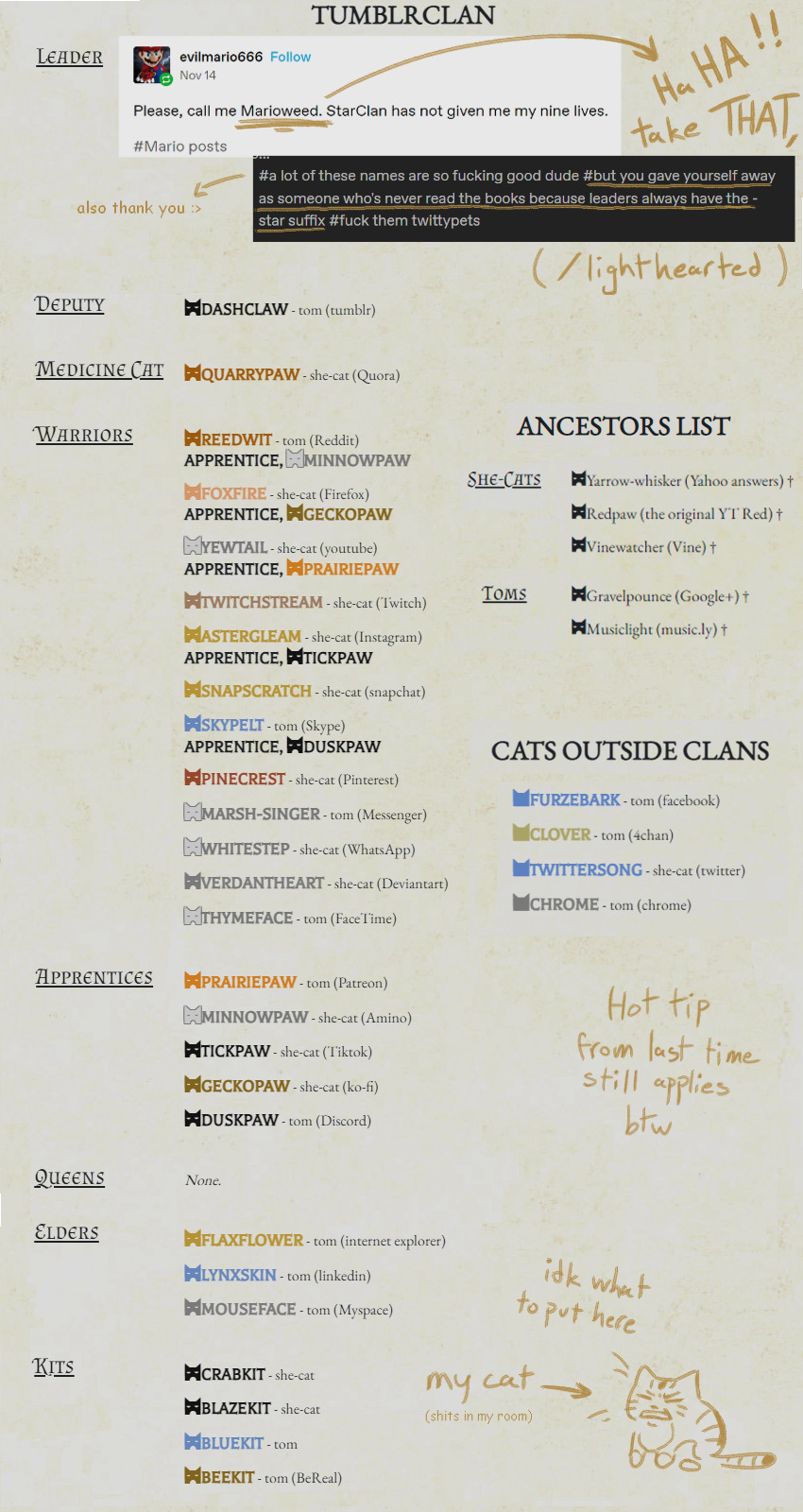

been struggling to draw lately so i went through some older stuff of mine and found this, only to realize i never posted it. i don't imagine anybody's still doing stuff for this weird social media-clan au thingy anymore, now that the meme of it has died down, but anybody's free to these names for whatever uses they want, if they want them :)
bonus lore to get it out of my head:
Yarrow-whisker was the previous medic before Quarrypaw, who has yet to gain their full status as a medicine cat in their absence
Geckopaw and Prairiepaw are siblings. Yewtail is only a so-so mentor at the best of times, so Foxfire effectively mentors them both. However, Prairiepaw has swooped in to support Yewtail when they decide to do something stupid and unsustainable on multiple occasions. they really shouldn't have been granted an apprentice tbh. i recently re-read Fire and Ice in the original warriors series so the parallels to Graystripe being a poor mentor to Brackenpaw are intentional
Skypelt came out of retirement to mentor Duskpaw, since they serve such similar real-life purposes. Skypelt doesn't understand everything their apprentice says or does but is generally supportive of such a similar application
Marsh-singer, Whitestep, and Thymeface are all siblings, and are collectively the youngest of the warriors (not accurate to the actual ages of the applications, but eh). to say they are all total gossips would be an understatement. they're also really interchangeable and forgettable. like the Runningwinds of apps.
depending on how positively you want to view the whole "reincarnation" trope some of the canon warriors books have, you could say that Tickpaw is a reincarnation of Musiclight. Otherwise, they just look really similar.
all of the "Cats Outside of Clans" cats are kittypets, with the notable exception of Furzebark, who is a banished rogue with a concerning amount of influence on the Clan(s?). maybe there's a whole band of rogues who are based on insidiously/surprisingly influential applications or online entities! various appstore/playsotre applications could fall under this category, as well as like. roblox, apparently. which is beyond weird to me since that's a game and not a wider application, but it got scarily profitable during lockdown, so...
Redpaw was Yewtail's sibling, but died during their apprenticeship. Probably to the same thing that killed Gravelpounce, but i have no idea what that would be
Flaxflower is generally considered WAY too old to still be alive (since the real internet explorer died a bit ago by now), but since he'd "find a way to be late to his own funeral", he has yet to kick the bucket.
the whole twittypet drama is EASILY the juiciest gossip the clan has had in ages, ESPECIALLY the half-clan checkmark-kits. in-universe, im interpreting the poor management of twitter that's been driving it into the ground irl as a negligent cat owner unintentionally driving their pet to spend more time outdoors with other cats (namely, dashclaw) to get away from them, which resulted in kittens. drummed-up anti-kittypet sentiment aside, many clan cats looking in on the situation just feel bad for her.
Vinewatcher is the most consistently "present" of the StarClan spirits, but is also the most consistently unhelpful. numerous potential prophecies later turned out to just be inside jokes of theirs they decided to continue rehashing into the afterlife. Quarrypaw, having not gotten much experience identifying what makes a legitimate prophecy yet, finds this exceptionally annoying behavior, and would like them to stop. They do not.
521 notes
·
View notes
Text
To bring about its hypothetical future, OpenAI must build a new digital ecosystem, pushing users toward the ChatGPT app or toward preëxisting products that integrate its technology such as Bing, the search engine run by OpenAI’s major investor, Microsoft. Google, by contrast, already controls the technology that undergirds many of our online experiences, from search and e-mail to Android smartphone-operating systems. At its conference, the company showed how it plans to make A.I. central to all of the above. Some Google searches now yield A.I.-generated “Overview” summaries, which appear in tinted boxes above any links to external Web sites. Liz Reid, Google’s head of search, described the generated results with the ominously tautological tagline “Google will do the Googling for you.” (The company envisions that you will rely on the same search mechanism to trawl your own digital archive, using its Gemini assistant to, say, pull up photos of your child swimming over the years or summarize e-mail threads in your in-box.) Nilay Patel, the editor-in-chief of the tech publication the Verge, has been using the phrase “Google Zero” to describe the point at which Google will stop driving any traffic to external Web sites and answer every query on its own with A.I. The recent presentations made clear that such a point is rapidly approaching. One of Google’s demonstrations showed a user asking the A.I. a question about a YouTube video on pickleball: “What is the two-bounce rule?” The A.I. then extracted the answer from the footage and displayed the answer in writing, thus allowing the user to avoid watching either the video or any advertising that would have provided revenue to its creator. When I Google “how to decorate a bathroom with no windows” (my personal litmus test for A.I. creativity), I am now presented with an Overview that looks a lot like an authoritative blog post, theoretically obviating my need to interact directly with any content authored by a human being. Google Search was once seen as the best path for getting to what’s on the Web. Now, ironically, its goal is to avoid sending us anywhere. The only way to use the search function without seeing A.I.-generated content is to click a small “More” tab and select “Web” search. Then Google will do what it was always supposed to do: crawl the Internet looking for URLs that are relevant to your queries, and then display them to you. The Internet is still out there, it’s just increasingly hard to find. If A.I. is to be our primary guide to the world’s information, if it is to be our 24/7 assistant-librarian-companion as the tech companies propose, then it must constantly be adding new information to its data sets. That information cannot be generated by A.I., because A.I. tools are not capable of even one iota of original thought or analysis, nor can they report live from the field. (An information model that is continuously updated, using human labor, to inform us about what’s going on right now—we might call it a newspaper.) For a decade or more, social media was a great way to motivate billions of human beings to constantly upload new information to the Internet. Users were driven by the possibilities of fame and profit and mundane connection. Many media companies were motivated by the possibility of selling digital ads, often with Google itself as a middle man. In the A.I. era, in which Google can simply digest a segment of your post or video and serve it up to a viewer, perhaps not even acknowledging you as the original author, those incentives for creating and sharing disappear. In other words, Google and OpenAI seem poised to cause the erosion of the very ecosystem their tools depend on.
47 notes
·
View notes
Text
Update to this post because a year later they're still trying it.
They vote again tomorrow, March 13th, to try and ban TikTok- only this time they're doing all they can to claim it's not a TikTik ban.
They claim it's to "protect Americans from 'Foreign Adversary Controlled Applications'" despite singling out ByteDance/TikTok specifically, and mentioning TikTok in literally the first sentence.

They also claim it's not a "ban," they're just giving TikTok the "opportunity" to divest from ByteDance and sell it's company, algorithms and source code to a non-communist county (the US) within 180 days or the US will take action and make the app inaccessible to USA Americans, which make up 150 million of TikTok's user base, the largest TikTok audience by country so far.
One could call this a shakedown, that effectively the US is trying to steal a popular and profitable company. "That's a nice company you got there, be a shame if you... I don't know... lost 150 million users- Wouldn't it?"
[Edit: Forgot to add that even though the US has 150 million TikTok users, that's still only like 8%-ish of TikTiks total userbase- making this "shakedown" an example of how Congress is embarrassingly USA-centric. TikTok will not sell just to avoid losing just 7%-8% of it's userbase, and Congress must know that- if not, that just proves the point even more. This bill is for all intents and purposes a BAN, regardless how they try to spin it, and they're being very USA-centric and Xenophobic about it]
Anyway-
This is the second vote. A House committee voted unanimously on Mar. 7th to advance the bill, and it will be voted on again by a Republican controlled House.
Please call or email your representatives and tell them to vote "No" on bill H.R. 7521.
This isn't about just losing an app. TikTok is unique in that it is currently the easiest place to organize and spread information that otherwise doesn't get as much coverage. It allows for real time coverage and updates by those living through major events going on around the word, and has allowed for increased awareness for such events that we likely wouldn't hear about otherwise. (i.e: the genocide in Palestine, Cop City, any of the bills trying to take trans rights/abortion rights away, etc)
If you don't know your representatives, just google "who are my representatives" and the first results should be links that will help you find them based on your zip code
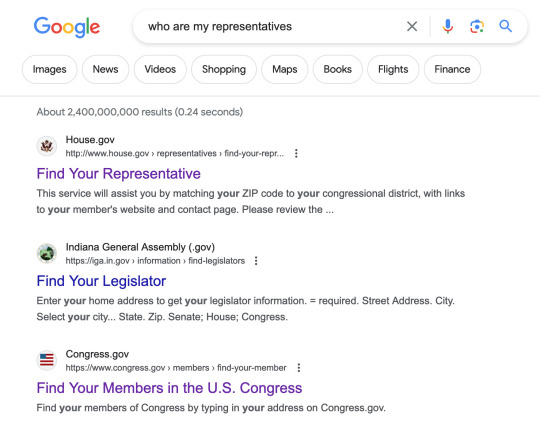
And if you don't know what to write I can help you there too.
You can write something as simple as just:
Vote "No" on bill H.R. 7521.
Seriously, that's all you need.
Or, if you want something a little more in depth, here's a script that you can either copy and paste or reword to your liking. I just re-worded the script from the ACLU link above to fit more specifically about the current bill (Though let's be honest, for all intents and purposes Congress is pulling the same shit in a different hat)
Dear Representative, I’m writing today to strongly urge you to protect our constitutional rights to free expression and to receive information, and to vote no on any bill that would give the federal government the power to ban entire social media platforms. Bill H.R. 7521 is designed to allow the government to ban TikTok in the US and would likely result in bans of other businesses and applications as well. Given what we know about TikTok, it’s clear that a ban would violate the First Amendment rights of millions of Americans who use the app to communicate and express themselves daily. Should these bills move to a vote, I urge you to vote “No.” In a purported attempt to protect the data of US persons from the Chinese government, these bills will instead block Americans from engaging in political discussions, artistic expression, and the free exchange of ideas. We have a First Amendment right to use TikTok and other platforms to exchange our thoughts, ideas, and opinions with people around the country and around the world. Please oppose any bill designed to limit our right to express ourselves — both online and off. Thank you.
Reminder, they vote tomorrow, Wednesday March 13th.
So please reblog this to spread the word and contact your representatives to tell them to vote "No" on this bill.
Do not be mistaken in thinking your opinion doesn't matter- it does matter so much. Do not let yourself be silenced!
#stop tiktok ban#tiktok#tiktok ban#internet censorship#important#urgent#sos#bad internet bills#internet freedom#congress#house of representatives#help
93 notes
·
View notes
Text
Are songs shorter nowadays and is it a problem for the popular music industry?
I feel like when we compare popular music from the 1980-90s to the 2010-20s, one of the main difference is the length of songs. At the 2024 Grammy Awards, a lot of the nominated songs were under 3 minutes with, for example, “Dance The Night” by Dua Lipa or SZA’s “Kill Bill”. But why is that?
In the 50s a 45-rpm single could only hold about 5 minutes of music so songs were, on the average, 3 and a half minutes long on vinyl records. In the 60s/70s artists started experimenting with longer pieces like Bob Dylan’s “Like A Rolling Stone” being more than 6 minutes long or “Bohemian Rhapsody” by Queen lasting 5 minutes and 55 seconds. In the 1980-90s, as CDs didn’t have the same restrictions as vinyls, the average song length was about 4 minutes but since 1990, on the Billboard Hot 100, songs length went from over 4 minutes to around 3, regardless of the genre. This decrease was caused by radio edits that shortened songs to 3 and a half minutes but it is mostly because of streaming platforms and social media.
The way streaming platforms work is pretty simple, an artist is payed every time a song of theirs is played in its entirety no matter its length so it is more economically profitable for them to make shorter songs. Listeners have to be engaged in the first 30 seconds of a song, making shorter intros and directly engaging and catchy hooks reduces the chances of the song getting skipped.
Social media, especially Tiktok, have changed the way we interact with music and artists; on the one hand it allows creativeness and an easy way to connect with people but it is also so fast-paced that it ruins our attention span, which is why shorter songs are preferred on those apps. We can see it with the 2023 Tiktok hit song “Super Shy” by the kpop group New Jeans being only 2 minutes and 34 seconds long
It is more profitable for artists to release shorter songs but some of them also do it to experiment with their art, like the singer PinkPantheress who said in an interview that she thinks songs don’t need to be more than 2 minutes and 30 seconds long. Her saying that resulted in a lot of backlash, people, from simple listeners to professionals, have expressed their opinion on the matter and have said that songs getting shorter is a big issue in the music industry. In a way I agree because if artists start to only make music for economic purposes, we will lose the art of it but at the same time, music length is something that has been changing for decades now and the popular music artists of our time are experimenting with their creations just like they did in the 60s and 70s so I don’t think it is necessarily wrong to think they way PinkPantheress does. Popular music has always, and will always be influenced by the latest technology and the way we, as the audience, consume it so I don’t see why it would be alarming or a threat to songwriting/ the music industry if songs are getting shorter.
9 notes
·
View notes
Text
Stop! Have you checked your phone’s ad privacy settings recently? No? Here’s a guide. It’s from 2022 but I can confirm that as of November 2024 the Apple stuff is still correct.
Android:
Settings —> Privacy —> ads —> delete advertising ID
On older versions you might not be able to delete the ID, but can reset it and there should still be a toggle to opt out: do both of those things!
iOS:
Two things to take care of, here. One) Apple already makes each app ask permission, but you can still tell it to just not even let them ask:
Settings —> privacy —> Tracking —> toggle off ‘allow apps to request to track’.
Two) settings —> privacy —> scroll riiiiiight down —> Apple advertising —> toggle off personalised ads.
Samsung:
Settings —> privacy —> Customisation services —> ‘stop customising all devices’
Xiaomi:
Settings —> passwords and security —> Authorisation & revocation —> toggle off ‘MSA’
Why it Matters
‘The ad identifier is a string of letters and numbers that uniquely identifies your phone, tablet, or other smart device. It exists for one purpose: to help companies track you.
Third-party trackers collect data via the apps on your device. The ad ID lets them link data from different sources to one identity you. In addition, since every app and tracker sees the same ID, it lets data brokers compare notes about you. Broker A can buy data from broker B, then use the ad identifier to link those two datasets together. Simply, the ad ID is the key that enables a whole range of privacy harms: invasive 3rd-party profiling by Facebook and Google, pseudoscientific psychographic targeting by political consultants like Cambridge Analytica, and location tracking by the U.S. military.
Sometimes, participants in the data pipeline will argue that the ad ID is anonymous or pseudo-anonymous, not “personally identifying” information, and imply that it does not pose a serious privacy threat. This is not true in practice. First, the ad ID is commonly used to help collect data that is obviously personally identifiable, like granular location data. If you can see where a person works, sleeps, studies, socializes, worships, and seeks medical care, you don’t need their email address to help identify them. And second, an entire industry exists to help trackers link ad IDs to more directly identifying information, like email addresses and phone numbers. In a vacuum, the ad ID may be anonymous, but in the context of the tracking industry, it is a ubiquitous and effective identifier.
Disabling this ID makes it substantially harder for most advertisers and data brokers to track you. These industries process data from millions or billions of users every day, and they rely on convenient technologies like the ad ID to make that kind of scale possible. Removing this tool from their toolbox will result in substantially less data that can be associated with you in the wild. It is not only beneficial to your privacy, it also makes the surveillance advertising industry less profitable.‘
9 notes
·
View notes
Text
soliciting advice from the mentally ill queer community, possibly especially @bananapeppers needed
without rehashing the context too much, as you know i got written up at work for saying the words homophobia and transphobia (yes that’s what the record says lol). my punishment is i have to go to see a therapist (counseling from a therapist or therapy from a counselor not clear) that they have chosen, and i have to consent to release some information about these sessions to my employer
going to set aside that i would not choose this therapist in the first place given any ability to consent at all in this scenario because she has what i consider to be a fake certifying degree from an online for profit institution and she does not work for a mental healthcare provider (she works for a company that sells telecounseling packages to human resources departments) lol, i have additional concerns about the appropriateness of the assignment because on her linkedin she identifies herself as catholic (specifically catholic educated)
fully no anti catholic bias intended (i love the catholic homosexual reading this) and to be fully honest, i have no other evidence on hand that she may be homophobic—no questionable social media or organizational affiliations. she frankly may very well not be. but i would never choose a healthcare provider who identifies their catholicism on their professional website to handle issues that i know to be controversial among catholics (like at all as a first choice but especially) without explicit reassurance that they are pro-queer and have experience in queer informed counseling (or are abortion loving if that were the situation, or believe that divorce should be legal and celebrated, whatever it may be) (once more full apologies for the stereotyping lol)
so the advice i’m looking for is how to have a conversation with her to establish whether she’s a queer friendly therapist (and there are some finer details i’d especially like to clarify). i know many of you have had to have these conversations and i’m wondering if you’d all give me pointers or some concrete questions to ask.
additionally, in a worse case scenario, can anyone who feels up to it share experiences or advice about surviving homophobic therapy experiences lol :/
a few notes:
i obviously considered not complying and lawyering up. it’s not off the table lol but there are various reasons i opted not to. the most pragmatic one is that i know many members of my union have to go through similar processes as the result of discipline and i want to see what that’s like for them. i could also gather evidence to build the case for making demands against this practice (which so far many unions consent to for various reasons even as they are legally questionable, if you’re in this situation in your union OR are mad about your union caving to this practice feel free to dm me to chat strategy.)
additionally, i probably cannot ask for a different therapist regardless of the outcome here, but having an explicit conversation is good for my case regardless. the best case scenario from here on would actually probably be for her to say i’m not comfortable with my ability to handle this topic but i can refer you to an explicitly queer informed counselor who for some reason also has a webtv therapy degree and works for the HR app.
why do i want to explicitly know that she’s okay on queer issues (or not) (im asking myself)? for one i am not sure i can literally survive yet more homophobic harassment at work (yes i know i’m baby but i make $20k working for a library this is the one thing i’m owed ok). but for another thing i do think it would be better to have some kind of record that they forced me to go to a homophobic counselor as punishment for making a complaint about homophobic harassment, if that’s the case.
the most generous read of the objective of this forced therapy would be to discuss more constructive behaviors lol for communicating about anti-queer behavior at work etc. perhaps even some emotional counseling regarding the honestly extreme toll this experience has had on my life. but i can’t proceed in good faith without a counselor who acknowledges that what i experienced was queer/phobic and that i have a right to not experience those things at work. that’s all. i do not want to sit in any additional meetings where i’m told that i have to listen to the perspective of the coworker who doesn’t believe she should have to respect queer people at work. however, if i do not proceed in good faith, i will be reported to my employer as not compliant and could face actual consequences.
please @ me thank you
23 notes
·
View notes
Text
It really is incredible how quickly the world of freely-accessible social media is dwindling— either falling apart internally or squeezed under the weight of tech monopolies. Or both.
Tumblr’s decision to remove nsfw posts to avoid strikes from Apple’s app store was what tossed the snowball down the mountain. Its demise was connected to internal mismanagement and the need to compete with other huge social media sites at the time they banned nsfw, which are all now under new management and/or owned by massive tech corporations.
That in particular is a point I would like everyone to think about. Every major social media site that we use is part of a larger billion-dollar corporation. Many of them started humbly— Facebook, Twitter, Tumblr, and Reddit were all created by average people. It goes without saying now that Facebook has become a monopoly itself, and we all know the shitstorm twitter is under, which has left us with two primary platforms for free social media: Tumblr and Reddit. We know what is happening to Tumblr, but what of Reddit?
Reddit is owned by Advanced Publications, who also own or have majority shares in companies like Charter Communications (the company behind Spectrum internet, as well as Vogue and The New Yorker) and Warner Bros. Discovery. With funding like that, obviously the intention is not to make Reddit a place of information and socialization— the real intent is to turn it into a money-making machine.
To ensure this, Reddit is in talks of making their company public, meaning they would have to answer to shareholders when making decisions for the website. Shareholders want to see continuous profit, and that cannot be done only through ad revenue, such that Reddit has primarily profited from for years. People can subscribe to Reddit to remove the ads, but subscription services alone don’t see the profits they want to make. The solution to this problem is to push Reddit competitors out.
Some of their biggest competitors, ironically, were their own userbase. Reddit has a slurry of third-party applications made by Reddit users themselves, using Reddit’s API which until recently has been free. Third-party apps such as Apollo gave users a way to use Reddit WITHOUT advertisements, which was lost revenue for Reddit all while using the site’s base code. As a result, this year (2023) Reddit began charging to use its API, resulting in all of these third-party apps shutting down. With no more internal competitors, it’s time to go public and see how much can be made by shareholders— they might even decide to use their new funds to buy out more social media sites, or further integrate failing ones into their system, just as they are with Snapchat.
All this talk about Reddit in a post that is supposed to be about Tumblr. But, the two are related. As Tumblr begins to fall into disrepair and demoderation, we will begin to witness the fall of free social media as we know it. Big tech has dug its fingers in what has quickly become an important piece to our social fabric. The platforms that give us news, connect us with friends and family, connects us to the world, and spreads information is in the hands of just a few tech companies. Tumblr is failing because Yahoo! is failing. Tumblr is failing because WordPress is failing.
It is incredibly easy to blame staff for their stupid decisions, and it should still be mentioned. However, my main concern is the accessibility to free social media itself. The fall of Tumblr is an example of a social media website whose poor decisions— namely the removal of nsfw posts, poor automated moderation and failures to adjust to an aging userbase— cost it everything, but what really resulted in its demise was competition. Tumblr could never compete with giants like Facebook or TikTok. Nowadays, the only site Tumblr could really compete with was Twitter, which will be under a subscription service come January. And as people flock to sites like BlueSky and Threads, the diversity of the online world will only continue to decline. It is exactly the lack of competition that will make it hard for any Tumblr-like to take off, especially since a site like this has always run on user participation, not profit.
My point is, look at the overarching bullshit that is taking away from online life and question whether it’s worth participating in. Find ways to protest online monopolies that are squeezing out competitor sites and making it harder for people to use social media, especially if they aren’t influencers. And take a step back from the staff drama to look at what hostile monopolies and an undemocratic internet is doing to communities like ours.
20 notes
·
View notes
Text
"What They Dont Want You To Know"Series
1. Corporate Influence on Legislation
Large corporations wield significant power in shaping laws and regulations through lobbying efforts. This influence often prioritizes profit over public interest, resulting in legislation that favors corporate agendas, such as tax breaks, deregulation, or loopholes that allow environmental harm. For example, the oil and gas industry has been known to lobby against stricter environmental protections, impacting climate policy and public health.
2. Food Industry Secrets
The food industry often obscures the truth about what goes into our food. Many products contain additives and preservatives that can affect health, yet these ingredients are not always clearly labeled. Additionally, practices such as factory farming raise concerns about animal welfare and antibiotic use, which can lead to antibiotic resistance. Understanding these secrets can empower consumers to make informed choices about their diets.
3. Environmental Degradation
While the impacts of climate change are widely discussed, the specific practices contributing to environmental degradation often receive less attention. Industries like mining and logging can devastate ecosystems, leading to biodiversity loss and habitat destruction. Moreover, the pollution from industrial activities can have dire consequences for local communities, particularly in marginalized areas, where regulations may be less stringent.
4. Data Privacy and Surveillance
As technology advances, the collection and use of personal data have become ubiquitous. Many people are unaware of how much information they share through social media, apps, and online transactions. This data can be sold or misused, leading to targeted advertising, identity theft, and breaches of privacy. Understanding these practices is crucial for protecting personal information in an increasingly digital world.
5. Mental Health Stigmas
Despite growing awareness of mental health issues, significant stigma remains, often fueled by societal norms and media portrayals. Many individuals suffer in silence due to fear of judgment or discrimination, which can prevent them from seeking help. Additionally, access to mental health services is often limited, particularly in low-income communities, highlighting the need for greater support and understanding.
6. Wealth Inequality
The gap between the rich and the poor continues to widen, fueled by systemic issues such as tax policies that favor the wealthy, inadequate wages for essential workers, and unequal access to education and healthcare. This growing inequality can lead to social unrest and economic instability. Understanding the underlying factors can motivate individuals to advocate for more equitable policies.
7. Pharmaceutical Industry Practices
The pharmaceutical industry is often criticized for its pricing strategies and marketing tactics, which can prioritize profit over patient care. Many essential medications are prohibitively expensive, leading to preventable health crises. Additionally, alternative treatments or generics may be overlooked in favor of branded drugs due to marketing influence, raising questions about healthcare accessibility.
8. Climate Change Denial
Despite overwhelming scientific evidence, climate change denial persists, often driven by financial interests in fossil fuels. This denial can hinder global efforts to combat climate change, as policy changes are delayed or blocked. Understanding the motivations behind this denial can help individuals advocate for more proactive climate policies and support sustainable practices.
9. Cultural Appropriation
Cultural appropriation refers to the adoption of elements of one culture by another, often without understanding or respecting their significance. This practice can exploit marginalized cultures while commodifying their traditions. For example, fashion brands may use indigenous designs without crediting the original creators, highlighting the need for awareness and sensitivity in cultural exchanges.
10. Energy Solutions
While renewable energy sources like solar and wind power have the potential to transform our energy landscape, they are often overshadowed by the fossil fuel industry. Many innovative technologies, such as energy storage and smart grids, could disrupt traditional energy markets. Raising awareness of these alternatives is essential for promoting sustainable energy policies and reducing reliance on fossil fuels.
#government#truth#energy#culture#climate change#big pharma#wealth#mental health#data#evironment#food#corporation details
2 notes
·
View notes
Text
DIGITAL MARKETING-WEB PULSE
Digital marketing is a broad field encompassing various strategies and tools used to promote products, services, or brands online. It leverages digital channels and technologies to reach and engage with target audiences. Here’s a breakdown of some key components:
Search Engine Optimization (SEO): Enhancing website content and structure to rank higher in search engine results pages (SERPs), thereby increasing organic (non-paid) traffic.
Content Marketing: Creating and distributing valuable content (such as blog posts, videos, infographics) to attract and engage a target audience, ultimately driving profitable customer action.
Social Media Marketing: Utilizing platforms like Facebook, Instagram, Twitter, LinkedIn, and others to connect with audiences, build brand awareness, and drive traffic.
Email Marketing: Sending targeted emails to nurture leads, engage existing customers, and drive conversions. This can include newsletters, promotional offers, and personalized content.
Pay-Per-Click (PPC) Advertising: Running paid ads on platforms like Google Ads or social media channels, where advertisers pay each time their ad is clicked. This can drive targeted traffic and generate leads quickly.
Affiliate Marketing: Partnering with other businesses or individuals (affiliates) who promote your products or services in exchange for a commission on sales or leads they generate.
Influencer Marketing: Collaborating with influential individuals or creators in your industry to promote your brand or products to their followers.
Analytics and Data Analysis: Using tools like Google Analytics to track and analyze digital marketing efforts, measure performance, and make data-driven decisions.
Online Public Relations (PR): Managing your brand’s online reputation and building relationships with digital media and influencers to gain positive coverage and enhance credibility.
Mobile Marketing: Reaching audiences through mobile devices via mobile apps, SMS, push notifications, and mobile-optimized websites.
Each component works together to create a cohesive strategy that helps businesses achieve their marketing goals, whether that’s increasing brand awareness, generating leads, or driving sales.

#digital art#digital marketing#tech#seo services#ppc services#e commerce#business#design#growth#grow your business#website
2 notes
·
View notes
Text
Top 10 Business Ideas That Will Make You Rich

In today's fast-paced and ever-evolving world, entrepreneurship offers countless opportunities to build wealth. Whether you're a seasoned entrepreneur or a budding innovator, exploring the right business idea can lead to significant financial success. Here are ten business ideas that have the potential to make you rich.
1. E-commerce Store
E-commerce continues to thrive, with online shopping becoming the norm for consumers. Launching an e-commerce store that caters to a niche market can be incredibly profitable. By offering unique, high-quality products, and leveraging digital marketing strategies, you can reach a global audience. Subscription boxes, eco-friendly products, or personalized items are examples of niches with high demand.
2. Digital Marketing Agency
As businesses shift towards online operations, the demand for digital marketing services has skyrocketed. Starting a digital marketing agency that specializes in SEO, social media management, content marketing, or pay-per-click advertising can be highly lucrative. Success in this field requires staying updated with the latest trends and delivering measurable results to clients.
3. App Development
The mobile app industry is booming, with millions of apps available on various platforms. If you have a background in coding or can collaborate with skilled developers, creating innovative apps can lead to substantial profits. Whether it's a gaming app, a productivity tool, or a social networking platform, a successful app can generate revenue through in-app purchases, ads, or subscriptions.
4. Real Estate Investment
Real estate has long been a proven way to build wealth. Investing in rental properties, flipping houses, or even starting a real estate development company can yield high returns. The key is to research markets thoroughly, understand property values, and manage your investments wisely. In addition to traditional real estate, consider emerging trends like vacation rentals and co-living spaces.
5. Health and Wellness Products
The health and wellness industry is experiencing rapid growth, driven by an increased focus on healthy living. Starting a business that offers health supplements, organic foods, fitness equipment, or wellness coaching can be very profitable. Consumers are willing to invest in products and services that promote a healthier lifestyle, making this sector a promising area for entrepreneurs.
6. Online Education and E-learning
The rise of remote work and online learning has created a massive demand for e-learning platforms and online courses. If you have expertise in a particular field, you can create and sell online courses, or develop a platform that connects educators with learners. This business model offers scalability and the potential for passive income, as courses can be sold repeatedly without additional production costs.
7. Renewable Energy Solutions
With the global push towards sustainability, businesses in the renewable energy sector are thriving. Starting a company that offers solar panel installation, energy-efficient appliances, or green building materials can be highly profitable. Governments and consumers are increasingly seeking eco-friendly solutions, making this an ideal time to enter the market.
8. Freelance Services Platform
The gig economy is expanding rapidly, with more people seeking freelance opportunities. Creating a platform that connects freelancers with clients in fields like graphic design, writing, programming, or virtual assistance can be a successful business venture. By charging a commission on transactions, you can build a profitable business while providing a valuable service.
9. Artificial Intelligence and Automation
AI and automation are transforming industries across the board. Starting a business that offers AI-driven solutions, such as chatbots, predictive analytics, or robotic process automation (RPA), can lead to significant wealth. Companies are eager to adopt AI technologies to streamline operations, reduce costs, and improve customer experiences, making this a high-demand area.
10. Subscription Box Service
Subscription box services have gained immense popularity, offering consumers curated products delivered to their doorsteps regularly. From beauty products to gourmet foods, subscription boxes cater to a wide range of interests. Starting a subscription box business allows for recurring revenue and customer loyalty, provided you offer unique and valuable products.
For more such content visit on Tanishq website .
Conclusion
These ten business ideas represent some of the most promising opportunities for building wealth in today's economy. While each requires a different level of expertise, investment, and commitment, the potential rewards are substantial. Success in any of these ventures will depend on thorough market research, innovative thinking, and relentless execution. By choosing the right idea and dedicating yourself to its growth, you can achieve significant financial success and long-term wealth. Click here to open other post.
2 notes
·
View notes
Text
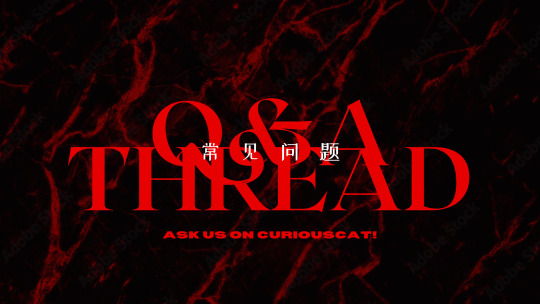
⚔ IN/FINITE: Q&A THREAD MASTERPOST 🍁
With how unpredictable they are, one can only wonder what Blade and Dan Heng are up to. Shall we review the archives for some of your questions?
❓ ASK US QUESTIONS: https://curiouscat.live/renhengzine
⚔ hi! super excited for this zine :) just wondering if applications featuring nsfw pieces will be allowed (as long as they are properly tagged)?
🍁 Hi! We’re happy to hear that! We strongly encourage you to submit SFW samples, but if necessary we ask that you submit no more than one explicit NSFW sample (properly tagged, of course). Mildly suggestive 16+ content is allowed regardless as this falls within the zine’s rating.
⚔ what is a switch shipper?
🍁 A switch shipper is someone who ships both top/bottom dynamics of a pair, in this case, both RenHeng and DanRen. Because this is a SFW zine, the Renheng dynamic will not be portrayed through explicit works.
⚔ Are works in Spanish allowed? Would you be interested in including this language?
🍁 Unfortunately none of our mods are Spanish speakers, so we are unable to moderate and/or beta content produced in Spanish. This zine will only be available in English and Chinese.
⚔ is there any specific format for samples of writer apps? it's the first time i apply to a zine so i know very little, sorry!
🍁 No worries! As specified in the zine document, all writing applicants should omit identifying information (e.g. usernames) from the sample. As such, we cannot accept direct links to Ao3 fics, Twitter threadfics, Tumblr fics, etc; please copy the text into a document before submitting. We also require each sample to be 1k-2.5k words long. Other than that, there's no specific formatting requirements; just make sure the document is readable!
⚔ "Any remaining profit will then be split between all moderators and participants involved in the project." will the profit be split evenly among participants/mods?
🍁 As we are still in the early stages of this project, matters such as compensation structure have not yet been finalized. We might consider other compensation models apart from even split depending on the Interest Check results. We will, however, have this confirmed before contributors apply so that applicants are aware of what they're signing up for!
⚔ Will you be judging applicants based on content they create outside of the pieces submitted in their application and/or by their social media presence?
🍁 Mods will only be looking at the content provided in an applicant’s samples/portfolio. We will do our utmost best to ensure that no one faces unequal or prejudiced treatment during the creation of this zine. Furthermore, your social media presence, such as how many followers you have, will not affect your application!
⚔ hello! im a bit confused over the difference of sample and portfolio for the writer's applications? may i ask at minimum how many do we need to submit? thank you so much :)
🍁 Hello! Those applying to be writers should submit a minimum of five (5) works in their portfolio. Three (3) of these works can be your samples--aka, works you especially want the mods to look at and that you are highlighting in your application! You can also submit three samples that are entirely different from the 5-7 works in your portfolio (for a total of 8-10 works total, if you have a large volume of works you think the mod team should take a look at).
⚔ Hello, sorry for the questions!! "Three individual samples in a similar quality and style that you would produce for the fanzine" do you mean that it have to be works with the theme of the zine?
🍁 Not at all! By this we mean your “writer’s voice”; if you hope to produce a lighthearted piece for the zine, your samples should reflect similarly lighthearted work, etc. Also, is your work dialogue-heavy or prose-heavy, does it incorporate elements of social media, etc.? We are not encouraging or discouraging any style in particular; we’d like to welcome writers of varied styles to the zine! The same applies to artists of varying art styles as well.
⚔ "A portfolio containing between five to seven pieces in a similar quality and style that you would produce for the fanzine" can it be works of any other type? sorry to bother and thanks in advance
🍁 We recommend against providing pieces dissimilar from the style you’d like to write for the zine as your portfolio will help us know what to expect from you should you be accepted! However, if you are unsure what you would like to write for the zine and want to showcase the flexibility of your style, you are welcome to do so.
⚔ Is there any visual examples for the writing/artist portfolio? Asking because I don't wanna mess up on it 😭😭
🍁 We have added sample writer/artist portfolios to the Info Doc! You can view those as an example of how to format yours, though they do not have to match exactly.
⚔ what is "xingyue"? Is it another name for renheng ship?
🍁 “Xingyue” refers to the ship of Yingxing and Yinyue-jun, Blade and Dan Heng’s respective names and titles when their previous incarnations met as part of the High Cloud Quintet. Hope this helps!
⚔ Was wondering how much detail are you looking for in backgrounds? I mostly like to draw characters as the main focus taking up most of the space and backgrounds are kind of simple for that reason. Just wanted to know in case I would need to add something that's more background focused to the portfolio. Thank you!
🍁 We'd love to include pieces with both detailed and simple/character-focused background. However, we would still like to see background work from artists beyond a simple flat color or gradient background. Show off your skills!
⚔ Hello! Where will the zines be shipped from?
🍁 The EN version of the zine will be shipped from the USA! We will also utilize an agent to distribute the CN version of the zine to patrons in mainland China.
⚔ Hello. Would it be okay if I participate in the zine though I haven't posted anything on twitter?
🍁 Yes! All we require is that you fill out the appropriate contributor application and provide samples of your work, but a social media presence is not required to participate in the zine.
⚔ will there no longer be poets in the zine?
🍁 After holding the Interest Check, we have seen that the majority of respondents are more interested in forms of writing other than poetry. Therefore, the mod team has decided not to include poetry in the zine and we will not be holding poet applications. We will, however, still be holding prose writer applications!
⚔ If you’re a writer for the portfolio could you post a series (like multiple chapters from a fanfiction) or do the writings have to be different?
🍁 We would prefer to see samples that originate from different bodies of work so that we may better gauge your abilities!
⚔ must the submitted piece (art and writing) be related to renheng?
🍁 Samples related to Renheng are encouraged but not required. You will need to submit at least one sample related to Honkai: Star Rail, though.
⚔ Can a writer use an already complete work in their portfolio for the final submission if accepted?
🍁 We would like contributors to produce new and original work for the zine, therefore any work included in an applicant’s portfolio is ineligible for publication in the zine.
⚔ Does an Ao3 account count as a "social media account where we can find your work and/or previous experience"? Or should we avoid linking Ao3 accounts at all?
🍁 You may link your Ao3 account in the given space! Writing applicants' identifying information will be hidden during the voting process; it is only the samples and portfolio that need to be blinded.
⚔ are contributors required to have a twitter account? or is discord the only social media needed?
🍁 Contributors are only required to have a Discord account to facilitate communication with the mod team. If you do not have any social media accounts, you may enter “N/A” in the appropriate field.
⚔ Hello does ao3 count as the portfolio?
🍁 AO3 does NOT count as the portfolio. Please avoid submitting AO3 links for samples or the portfolio. You may link your AO3 profile as your social media or proof of work uploaded before 2022, as these fields will not be visible to the mod team during the process of judging samples.
⚔ Is there a preferred format our writing samples should be sent as? PDF, Doc, etc?
🍁 Any format is fine, so long as there is no identifying information included in the samples.
⚔ hi! could you explain why the portfolio has to be a dedicated folder labeled specifically? does an existing portfolio site not suffice?
🍁 Hi! The naming convention was included on the assumption that applicants would be submitting a portfolio through a folder, as is common in zine spaces, but an existing portfolio site can be used as well! Please note, a writer’s portfolio should not include identifying information!
⚔ why are writer apps blind but not artist apps?
🍁 Writer apps are blind as per the preferences of our Writing Mod, in the interest of removing bias as much as possible. Our team is not as strict on this principle for Artist apps because many of us are deeply involved in the fandom and are therefore familiar with many people’s art styles; thus, an artist’s identifying information does not hold as much sway. Regardless, we are only considering the samples themselves in the judging process, not who created them!
⚔ When I paste the Google Drive link, the name of the email appears, is there a problem with this?
🍁 This is fine, when the team opens the link we only see the name of the file and its contents!
⚔ Is there a problem if people applying speak another language? (but they send the work in English)
🍁 Hi! As long as you are able to communicate with the mod team in English and your piece for the zine is written in English, there is no problem!
⚔ Hi, I'd like to apply as a writer for the zine, and as I'm filling up the forms, I'm realizing that they're asking for 'images' on the writing app. Should I submit my samples as images in a folder instead?
🍁 Hi! We apologize for the confusion; that was a lingering typo! You do not have to submit your writing as images, PDF or word-processor documents are fine!
⚔ Just to confirm, if one were to have no social media, the social media question on the first page of the Google Form should be answered with NA?
🍁 Yup! Social media is not a requirement to participate, please delineate the field as NA if you do not have any applicable accounts.
⚔ are you looking for chinese writers? if so, can chinese works be submitted in the same portfolio as english works?
🍁 Hello! Our Chinese writers will be selected from recommendations provided by the CN fandom during the Interest Check. We apologize for the disappointment this may cause, but we encourage you to apply to the EN zine!
⚔ Hi is double application allowed?
🍁 Hey! If you are asking if you’re allowed to apply to multiple positions (page artist, merch artist, and/or writer), then yes, this is allowed, but you can only be selected for one position.
⚔ Hello, it must have a HSR/renheng piece on the samples?
🍁 Hi, a Renheng sample is encouraged but not required; at least one HSR sample does need to be submitted! HSR samples can feature any of the characters in the cast, not just Renheng.
⚔ hi! i'm very new to this, what goes in pitches in writers apps?
🍁 Hello! The (optional) pitch is where you can share any ideas you want to draw or write for the zine! These do not need to be very detailed; a pitch like “Future Renheng sharing tea on the Astral Express as they make amends” would give us a good idea of what you are looking to create.
⚔ knowing the zine is 16+, may applicants (writers especially) submit NSFW works as sample and/or portfolio?
🍁 As the zine won’t be featuring NSFW works, we strongly encourage applicants to submit pieces rated 16+ or lighter; if necessary we ask that you submit no more than ONE (1) NSFW piece with appropriate content warnings.
⚔ Will earlier submissions be judged first? As such will earlier submissions stand a better chance of being accepted?
🍁 In the interest of returning results to applicants in a timely manner, the mod team will vote on submissions throughout the open period for Contributor Applications. We will not, however, make any final decisions on applications until after the application period is over, and thus earlier submissions will not have a different chance of being accepted compared to later submissions.
⚔ Can the samples to be submitted be uploaded to ao3/twitter?
🍁 Samples can be independently uploaded to whichever platform(s) you like, but we ask you refrain from providing links to any works in which your identifying information is present. Ex; you can copy the text from your fic on AO3 into a Google Doc but don’t mention your credit name within the sample!
⚔ is it ok if only xingyue writing samples are given? or is a renheng sample needed too? thanks in advance!
🍁 xingyue writing samples alone are fine! There is no requirement to submit renheng or xingyue samples, although we do appreciate them!
⚔ given the contributor breakdown, doesn't the compensation model mean that the mods (even after splitting amongst the team) end up making more % profit than any individual contributor would?
🍁 Hi! We don’t mean to discredit the efforts of our contributors in any way by the slight difference in % compensation. Our model recognizes the large amount of work and time commitment the mod team has taken on in order to bring this project to life, and we feel that we’ve established a fair and reasonable split in potential profits accordingly.
⚔ Will you send rejection e-mail for the people that were not chosen?
🍁 Yes, we’ll send all applicants an email regarding their application status on October 21st.
⚔ hi! is there a specific time (and time zone) that contributor apps will be closing on oct 15? i only ask because i don't want to accidentally get time zones mixed up
🍁 Contributor apps will be closing approximately 11:59PM EST on October 15th!
⚔ Hi, does your application form send an email when it’s submitted?
🍁 Hello! Yes, our forms are set to send a confirmation email when submitted. It may have ended up in your spam folder; if you still don’t see it, feel free to reach out via email or dm and we can check to see if we received your application!
⚔ Since there are already at least 2 guest writers, does the total of 5 writers for the zine remain unchanged?
🍁 Hi! We have only brought on 1 guest writer. Four more writers will be brought on through the contributor application process!
Last edited: October 7, 2023. This post will be updated as we answer more questions, so stay tuned!
#renheng#dan heng#hsr blade#honkai star rail#zine#fanzine#hsr#xingyue#imbibitor lunae#yingxing#honkai star rail fanart#hsr fanart#zines#honkai zines#hsr zine#fandom zine#fan zine
13 notes
·
View notes
Text
Small Palestine Support Information Thread
I like collecting and organizing information, it's like enrichment to my autistic pea-brain. As a result, I have decided to collect and organize information in a way that can potentially help contribute to aiding Palestine and shitting on Israel. If there is an entry on this list that is deemed untrustworthy, or you would like to contribute a source to the list, feel free to let me know! General Educational Resources About Palestine
Decolonize Palestine https://decolonizepalestine.com
Palestine 101 https://www.thepalestineacademy.com/palestine-101 Bread Recipe by a Palestinian Cook
(I'm sorry but it looked really tasty) https://mxriyum.com/kaak-al-quds-jerusalem-bread
~~~~~~~~~~~~~~~~~~~~~~~~~~~~~~~~~~~~~~~~~~~~~~~~~~~~~~~~~~~~~~~ Information Correlating To The Genocide Itself
October 7 Fact Check https://www.oct7factcheck.com/index Zionism Observer (A database containing direct quotes and sources with timestamps of genocidal intent in Israel) https://zionism.observer
~~~~~~~~~~~~~~~~~~~~~~~~~~~~~~~~~~~~~~~~~~~~~~~~~~~~~~~~~~~~~~~ Palestine Donation Resources Palestine Children's Relief Fund https://www.pcrf.net Link to tweet detailing how to donate e-sims through Simly (If you don't have twitter [keep it that way], the second link is to a tumblr post with the same information) 1. https://x.com/sofidilla/status/1721335795330822473?s=20 2. https://www.tumblr.com/spectra-bear/740308813101645824/heres-how-to-donate-e-sims-to-someone-in-gaza?source=share
Pious Projects' Emergency Winter Relief Aid for Gaza https://piousprojects.org/campaign/677
~~~~~~~~~~~~~~~~~~~~~~~~~~~~~~~~~~~~~~~~~~~~~~~~~~~~~~~~~~~~~~~Boycott and Activism Resources NoThanksBoycott App Linktree (NoThanks is a mobile application that allows you to determine if a product you're buying is from a pro-Israel company or not) https://linktr.ee/Nothanksboycott?utm_source=linktree_profile_share<sid=2c19b845-076e-44e6-a446-b11423edc49b BDS List of Companies Supporting Israel https://bdsmovement.net/Act-Now-Against-These-Companies-Profiting-From-Genocide
5 Calls (US only) (Provides contacts for US congressional representatives based on your location if you're in the US. There's also a script for how to structure the call) https://5calls.org/issue/israel-palestine-gaza-war-hamas-ceasefire
~~~~~~~~~~~~~~~~~~~~~~~~~~~~~~~~~~~~~~~~~~~~~~~~~~~~~~~~~~~~~~~ Other Resources Ceasefire Tracker (Keeps track of individuals that have called for a ceasefire) Twitter: https://twitter.com/Ceasefire_Track Website: https://www.ceasefiretrack.com Accountability Archive (The reason I didn't include this in the info resources is because the database is not directly accessible. You can still submit evidence of public figures promoting the genocide in the form of website URLs however) https://accountabilityarchive.org
Hasbara Tracker (Another database that isn't currently accessible. They are looking for volunteers to help with receipt collection and organization though!) https://hasbaratracker.com US Congressional Representative Ceasefire Call Tracker (US only) (a list of represenatives and senators that have called for a ceasefire) https://workingfamilies.org/ceasefire-tracker
~~~~~~~~~~~~~~~~~~~~~~~~~~~~~~~~~~~~~~~~~~~~~~~~~~~~~~~~~~~~~~~ Hopefully this helps someone contribute to the cause. The fact that we have to deal with a slaughter like this in 2024 is utterly abhorrent, especially when you have many of the world's leading powers are turning a blind eye to/actively supporting the perpetrators.
I also understand that contributing to something to any cause can seem incredibly daunting. You have people on social media saying to do so many things that it can feel overwhelming at times. The good news is that even the simplest of actions can help contribute to positive change. This can mean doing stuff like reposting/promoting information about the events at hand on social media, signing petitions, or calling your local representative (if you have one).
#palestine#gaza#free palestine#free gaza#I know I don't post about it much on here#it's largely because I don't want to sound disingenuous regarding the matter#so hopefully this list amounts to something for someone
5 notes
·
View notes
Text
We Control the Narrative - On Website Eugenics, Homestuck, and Your Problematic Favs
I entered the digital realm at about 10 years old, just barely witnessing the shift from the web to apps. I played Runescape on a dusty old desktop fitted with Windows XP and would browse through the open forums for games I would never play. But as much as I try to remember the endless dotcom online world and its endless whimsy, works like Kate Wagner’s 404 Page Not Found expose just how far gone that era truly is. For two decades now, the internet has been gradually appropriated by a powerful few, corralling an expansive and free userbase into an easily controlled market.

The shift from the open web to centralized apps has gradually stripped the individual user of the “thrill of the hunt” that characterized the Web 2.0 era. Kate Wagner reflected on the fleeting memories of the open internet, and that nostalgic experience of stumbling upon a single customized site that silently broke down the boundaries of the digital realm. Any website on any page of your search results could yield a treasure trove of groundbreaking new knowledge, media, and community. Sometimes this was finding a new online game, like how it felt to log in to Club Penguin for the first time. But more often than that, it was entire networks of individuals and media that would defy all expectations for what art, and the internet, can be.
This quote pulled from internet historian Olia Lialina summarizes the landscape best:
“It was a web of sudden connections and personal links. Pages were built on the edge of tomorrow, full of hope for a faster connection and a more powerful computer.”
But in a post-iPhone world, the shift towards streamlined and prescribed apps neglected the web into obsolescence. Maximalism gave way to minimalism, UIs gradually deteriorated, urging you to download their new app or subtly manipulating the content that browsers would expose users to. As a 90s kid, Wagner watched this happen in the fall of MySpace, where personal archives were purged simply because it was not profitable to keep them around. For me, it was the fall of Adobe Flash, and the creative media that it took away.

Adobe Flash and I go way back, spanning from Elementary school lunches in the computer lap playing Cool Math Games with all my classmates to late-night exploration on the family laptop. One of my most memorable internet experiences came in the months after I discovered Homestuck, a multi-media webcomic that dominated niche digital communities since its debut in 2009.
Having started only 2 years after the iPhone came out, Homestuck is a legend of early Web 2.0, with a rich and expansive digital narrative that the Atlantic dubbed “a story that could only be told online”. By blending IM chatlogs as dialogue, GIFs as panels, flash media, fully animated videos with complete soundtracks, and a one-of-a-kind narrative, this interactive site would draw in millions of users with each update and bridge the divide between forums, personal blogs, and social networks like Twitter and Tumblr.
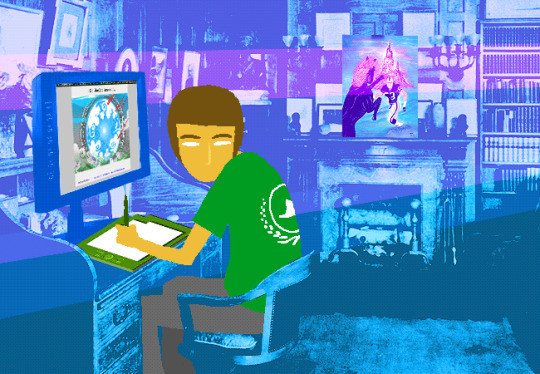
I will always remember the day that Act 6 of the series came to a climax with the flash video [S] Collide (April 6th 2016, the best day of my 13 year-old, internet-dwelling life), and of course, July of the next year when it was announced that Adobe Flash would die by the end of 2020.
When Flash went down all those years later — while Homestuck was still being updated on this same site — the new owner of the series’ publishing and printing rights Viz Media made little effort to preserve the 8000+ page time capsule. This prompted fans of the series to come together to compile the Unofficial Homestuck Collection, an optimized, offline version of the original site, even offering language filters to correct its less tasteful writing choices. This was an invaluable act, but it also represents a process of corporate neglect, and the ongoing cleansing of any media online that is deemed unworthy of preservation. Wagner compared this to a series of minor Libraries of Alexandria being burned to the ground, and rich personal narratives being buried beneath a controlled legacy of human history.
“The artifacts of internet life are personal—that is, not professionally or historically notable—and therefore worthless.”

Homestuck fans are split between those who recognize it as a postmodern masterpiece comparable to Ulysses, and those who would be happy to see it left in the rubble of the old web. I understand the desire to leave the unfavourable behind us, but accepting the latter narrative gives in to what Wagner called “Website Eugenics”; A process of devaluing the maximalist, often personalized and gaudy, or in some way flawed in favour of the minimalist, rigid professional class standards being set for the contemporary web. In the case of “dated” media, either cringey personal blogs from middle school or crass lowbrow humour, they will be posited as a damper on material history, when in fact it is deeply human.

The more that we accept a narrative of some digital remnants being of value, and others being a poor reflection of our popular culture, the more that we allow an oppressive power dynamic to play out. Everything, even your cringey middle school Myspace or Tumblr blog, or a webcomic that was drawn in MS paint, deserves to be preserved. If the select few get to control the narrative of the majority, we slowly lose these beautiful connections between ourselves, our media, and our ongoing futures. Internet historians, archivists, and cultural commentators like Kate Wagner are doing what they know combats this agenda; revel in the legacy of the early web, retain all that you can, and do it authentically.
24 notes
·
View notes
Text
Hello 👋🏽
You change things shouldn’t be changed. You not change things that mothatrucking needed to be changed
Usability & logic is gone
Friendly atmosphere is long time ago past
User friendly workable procedures are missing
User own hashtags got removed
Only profit oriented
Spam and Ghost Blogs everywhere & not to get blocked functionality
Erotic cartoons get flagged, disrespectful disgusting hardcore porn every phucKing where remains
Dumblr app upgrades Are downgrades Deluxe on iOS and Android (without jailbreak we are phucked because iOS Apps downgrade not possible) and after upgrading You apps what should we do? Buying nu iOS devices, because of this? 😆
Android app is just crap 💩 not able to go the reblog before etc
Smartphone resources hungry applications, resulting in force closes, debug Your Apps please 🥺
iOS App newer then version 20.x don’t show the already given tags anymore 🏷️
You editing near daily the tag archives from Dumblr itself
Help desk is so long Time ago not exist
BTW I like the new emoji in the notification 📣 🫶🏽
I love tumblr since 2011 but I don’t understand these decisions and for what u stand anymore
We should be a, as the words SOCIAL media’s and COMMUNITY means: a team and not get treated like pigs and consumers: better say Your enemies 🫶🏽📣
Please 🥺 make it to a better place here. Again!
Thank You 🙏🏽
Peace ☮️
Alex ♌️
@staff @staffs-secret-blog @support 🫶🏽
𝑵𝒆𝒘 𝑾𝒐𝒓𝒍𝒅 𝒃𝒚 𝒁𝒂𝒑 𝑴𝒂𝒎𝒂 🎧
maybeiamadreamerbutiamnottheonlyone ✅
#open letter#staff#usability#Logic#priorities#community#social#4/2024#mf peace#☮️#📣#🫶🏽#shit list#bugs bugs bugs 🐜#x-heesy#now playing#music and art
3 notes
·
View notes
Text
6 PILLERS OF DIGITAL MARKETING
Search Engine Optimization (SEO): Search engine optimization is the practice of optimizing your web pages to increase your website’s visibility organically in the search engine result pages (SERPs).It involves optimizing your website to rank higher in search engine results pages (SERPs) and increase visibility and organic traffic. This includes keyword research, on-page optimization, link building, and content creation.

SEO is completely different from search engine (paid) advertising. With paid advertising, you’re paying search engines like Google to show your website on the search result page. Instead, with SEO, you’re optimizing your website so it organically shows up on the first page of the search result. The number of visitors who come to your website through these search results is defined as organic traffic (because they found your website themselves).
Pay-Per-Click Advertising (PPC):PPC stands for pay-per-click, a model of digital advertising where the advertiser pays a fee each time one of their ads is clicked. Essentially, you’re paying for targeted visits to your website (or landing page or app)
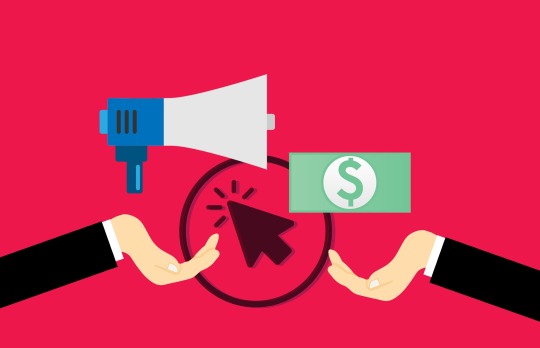
It involves placing ads on search engine results pages or other websites, and paying a fee each time someone clicks on the ad. This includes Google Ads, Bing Ads, and social media advertising.
Content Marketing:Content marketing is a strategic marketing approach focused on creating and distributing valuable, relevant, and consistent content to attract and retain a clearly defined audience — and, ultimately, to drive profitable customer action.

It involves creating and sharing valuable, relevant, and consistent content to attract and retain a clearly defined audience. This includes blog posts, articles, videos, podcasts, and social media content.
Social Media Marketing:
Social media marketing is a form of digital marketing that leverages the power of popular social media networks to achieve your marketing and branding goals. But it’s not just about creating business accounts and posting when you feel like it. Social media marketing requires an evolving strategy with measurable goals and includes:

Maintaining and optimizing your profiles.
Posting pictures, videos, stories, and live videos that represent your brand and attract a relevant audience.
Responding to comments, shares, and likes and monitoring your reputation.
Following and engaging with followers, customers, and influencers to build a community around your brand.
Email Marketing:Email marketing is a powerful marketing channel, a form of direct marketing as well as digital marketing, that uses email to promote your business’s products or services. It can help make your customers aware of your latest items or offers by integrating it into your marketing automation efforts. It can also play a pivotal role in your marketing strategy with lead generation, brand awareness, building relationships or keeping customers engaged between purchases through different types of marketing emails.

Analytics and Reporting: It involves measuring and analyzing your digital marketing efforts to understand their effectiveness and optimize your strategies. This includes tracking website traffic, conversion rates, ROI, and other key performance indicators.

#digital marketing#searchengineoptimization#ppc services#emailmarketing#marketing tips#analytics#social media marketing#seo expert#seo tools#content creation#content marketing
15 notes
·
View notes